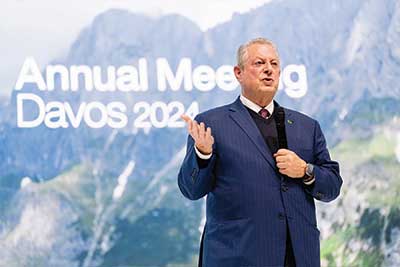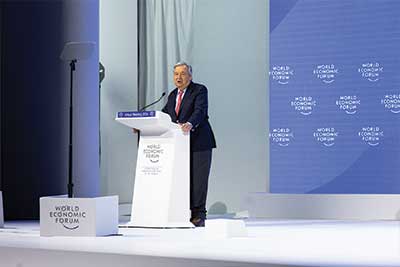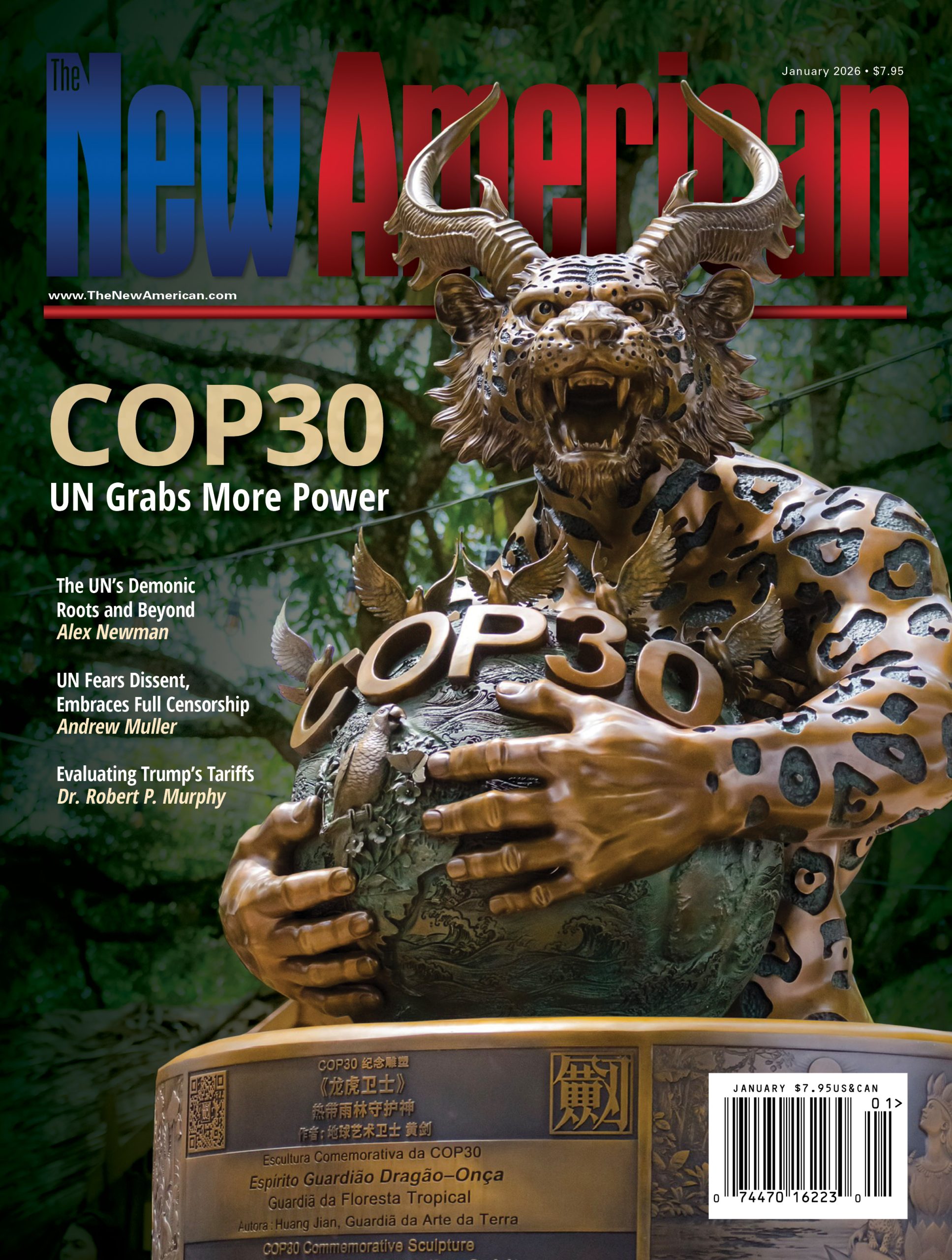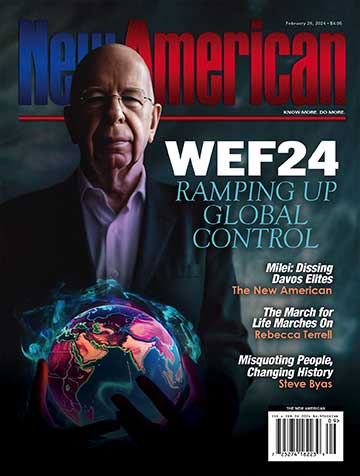Vol. 40, No. 04
02/26/2024
WEF24: Ramping Up Global Control
This year’s annual meeting of the World Economic Forum in Davos claimed to be about “Rebuilding Trust.” It was really about strengthening the globalists’ control over humanity. ...
The annual meeting of the World Economic Forum (WEF) in Davos, Switzerland, is over, and the new year’s program of globalism is off and running. Since 1971, the annual January confab of globalists and radical-left activists has served as the agenda-setting venue for each year’s slate of globalist events. This year was no exception; many of the Davos participants laid the rhetorical groundwork for major globalist events later in 2024, including September’s Summit of the Future in New York and December’s COP29 in Azerbaijan. But this year’s edition of the WEF was tempered by the growing awareness among globalist elites that many of their agenda items are in serious jeopardy. The theme of this year’s event, “Rebuilding Trust,” was a transparent sign that Klaus Schwab, the WEF’s Central Casting-esque founder and leader, senses that the power and influence of globalists are very much on the wane, even as nationalism and a renewed interest in liberty are transforming governments and societies from Finland and Italy all the way to Argentina.
Some of that nationalism and newfound interest in liberty found its way into the Davos proceedings in the persons of Javier Milei, Argentina’s new libertarian president, and Heritage Foundation President Kevin Roberts, both of whom sharply criticized the globalist elites running the WEF show. But in the main, this year’s presenters and conferees stayed on script. For now, at least, the twin causes of globalism and radical leftist cultural Marxism continue to be the driving ideologies for the Davos dons.
Probably the most striking and widely commented-on imagery to emerge from this year’s WEF was of a shamanic ritual in which a Brazilian shamaness, adorned in colorful garb and face paint, proceeded to cough on the heads of several visibly startled besuited personages. The shamaness, a chieftess whose name is Putanny Yawanawá, hails from the Yaminawá, or Yawanawá, tribe of Brazil’s Acre state in Amazonia. The Yawanawá, or “people of the peccary,” consists of about 2,600 people living in seven extremely remote villages deep in the Amazon rainforest. Very few of them are literate or speak either Portuguese or Spanish. They are committed to maintaining their traditional way of life in their tropical rainforest idyll, having supposedly rejected modern civilization in favor of Rousseauean noble simplicity. Nevertheless, the Yawanawá, like some other indigenous tribes in Amazonia, are happy to make a few escudos by inviting foreign tourists to their villages to participate in cultural immersion, the main attractant of which is ayahuasca-fueled shamanic ritual.
We should note that the lifestyle of the Yawanawá, like that of most indigenous peoples, is not one that most of us would envy or wish to emulate. Full facial tattoos and frequent use of ayahuasca are the order of the day, while the staggering biodiversity of the Amazon includes abundant bullet ants (which pack the world’s most painful sting), botflies (whose larvae frequently feed on living human flesh), electric eels, piranhas, and candiru catfish. Life in the Amazon under traditional norms is brutish and often short, which is why the majority of indigenous tribes living there have chosen to adopt Western ways to varying degrees.
The same can be said of so-called indigenous peoples worldwide. Whatever the primitive virtues of people living in Stone Age simplicity in the world’s rainforests, deserts, tundras, taigas, and mountains, nearly all of them have chosen to access, to varying degrees, the benefits of modern civilization with its miraculous and life-enhancing medicines, labor-saving inventions, and ability to travel and communicate all across the world. Those who wish to visit the Yawanawá do so via a four-to-six-hour ride by motorboat, for example, while tribal members wishing to exert influence on the outside world do so by flying to events such as the WEF — not, we hasten to add, by shamanic soul flight, but in modern jet airplanes.
Shaman-ful episode: The Davos crowd brought various shamans and other mystics representing indigenous cultures to the conference, including this lady from Brazilian Amazonia, who performed in one session a shamanic ritual coughing all over each of the panelists. Such sensational performances smack more of exploiting aboriginals in colorful garb than of serious proceedings. (AP Images)

All of which raises the question of why the jet-setters at Davos appear so keen on foregrounding at their events so-called traditional societies and their ways of life. This year featured the launch of a new WEF initiative, of which Putanny Yawanawá was a part: the Indigenous Peoples Knowledge and Leadership Network, billed as “a community of global indigenous leaders building multistakeholder collaboration and public-private cooperation in indigenous movements.” The point, seemingly innocuous enough, is that indigenous leaders, while constituting only a very small percentage of the world’s population, enjoy a disproportionately large stewardship over both land and biodiversity, and therefore ought to have a voice among the world’s most powerful. And while some of us might envy Chieftess Putanny’s opportunity to cough and spit all over the likes of IMF managing director and WEF regular Kristalina Georgieva, World Bank president Ajay Banga, and billionaire environmentalist André Hoffmann, there’s a deeper point to this sort of spectacle that cannot be ignored.
It is this: Globalists and radical leftist elites detest modern Western civilization — professedly for its exploitative, neocolonialist ways, but actually for its exponential amplification of individual liberties and standards of living. In the false ideological context of modern Westerners as vile consumers of the Earth’s resources, cynical oppressors and exploiters of the world’s underdeveloped majority, and selfish adherents of outmoded ideologies of rugged individualism and racial superiority, the indigenes of the Amazon, the Sahara, and the taiga are portrayed as more environmentally aware, more compassionate, and more benignly collectivist.
In other words, the suits at Davos and other elite globalist venues are happy to exploit indigenous peoples for their own self-serving ends, chief among them being their unconcealed loathing for modern Western civilization and their determination to subvert it by any means possible.
In Their Own Words
Extreme though this may sound, these globalists’ own words belie their supposedly compassionate motives. For example, Jojo Mehta, a prominent, Oxford-educated environmental activist, enjoined panelists at a WEF session entitled “Where Nature Meets Conflict” to consider seriously the designation of “ecocide” — i.e., environmental destruction — as a new category of crime. “If you are campaigning for human rights,” she told her fellow panelists, “at least you know mass murder, torture all of these things are serious crimes, but there is no equivalent in environmental space. Unlike an international crime like genocide that involves a specific intent, with ecocide what we see is what people are trying to do is business, is to farm, is fish, is produce energy, but what is missing is the awareness and the conscience of the side effects, around the collateral damage that happens with that.” The co-founder in 2017 of Stop Ecocide International, Mehta might be dismissed as a malcontent of little consequence until we consider that 11 countries — including Ukraine, Georgia, Armenia, and France — have already codified “ecocide” as a new class of crime, while an additional 27 countries, some in the EU, are seriously considering following their example. This is according to Stop Ecocide’s own website.
In other words, there’s a serious and growing movement afoot to criminalize a wide range of human extractive activities, including fishing and logging — extractive activities necessary to sustain modern civilization, which are unfavorably contrasted with the simple, sustainable ways of indigenous tribes. The conclusion we’re all supposed to draw is that modern civilized Western ways are bad, and primitive aboriginal ways are good. Criminalizing development and resource extraction in the name of “ecocide” certainly drives the point home.
Coughing shamans and endangered ecosystems aside, the World Economic Forum condemned a broad range of civilized practices, including traditional styles of rice cultivation responsible for feeding as much as half of the world’s population — most of them living outside the Western world. Bill Anderson, CEO of Bayer AG, a corporation as invested in biotechnology as it is in pharmaceuticals, told a panel that traditional rice paddies release unacceptable amounts of greenhouse gases (methane in particular). “In most of Asia,” Anderson said, “rice is still grown with traditional methods, which requires flooding the fields. And when you flood the fields, you basically kill the weeds with water, which sounds good, except it takes huge amounts of water. They basically decompose under water, and when they do that, they release methane. And so rice production is one of the largest producers of methane, which is many times more toxic in terms of greenhouse gas emissions.”
But the problem gets more complex than that. Global rice production is now having difficulty meeting global demand — supposedly because of global warming. Being water-dependent, rice production plummets during times of drought, which, the climate claque assures us, are becoming more frequent and more severe, owing to a warming, drying climate. In other words, rice cultivation is being cast as both a major cause and a major victim of man-made climate change. It is said (by authorities at the World Bank, who are hardly disinterested parties) to account for 10 percent of global man-made methane emissions.
Part of the solution — and, no doubt, one that biotech companies such as Bayer wholeheartedly sustain — is new technology designed to allegedly optimize rice harvests while mitigating methane emissions. So-called CRISPR technology (gene editing) is being used to create varieties of rice that are more drought-tolerant and more productive. This type of research, be it noted, has been going on for generations, as crop scientists have sought to develop varieties of corn, wheat, and other staples that have higher yields while costing less to plant and cultivate. And new strains of rice that are higher-yielding ought to be commended. But the scapegoating of one of the world’s most useful crops, which has literally fueled the rise of civilizations for millennia, is the pinnacle of modern hubris. And efforts to do away with traditional modes of rice farming compulsorily, in the name of saving the climate, are yet more eco-absurdity.
No climate conclave is complete without a certain political fossil fueling the fire of controversy. Superannuated centimillionaire Al Gore put in an appearance, preaching fire and brimstone against heretics who reject the sustainability gospel. “The fossil fuel polluters use a portion of their wealth from digging up dead things from the earth and burning them in ways that destroy the future of humanity,” Gore thundered to his captive audience. “They use some of their wealth to confuse people. I get a little exercised about this, because I’ve watched it for a long time, and it’s driven by pure greed! Pure greed!... If we deploy electric vehicles, solar, wind, batteries, green, hydrogen, and the rest, and we get to true net zero, temperatures on the earth will stop going up almost immediately!”
Overall, a large portion of WEF 2024 felt like carryover from COP28, with speaker after speaker denouncing fossil fuels and reaffirming the intent to eliminate them altogether — the one action item that did not quite come to fruition at last year’s UN climate conference in Dubai. Ex-climate envoy John Kerry made it clear that the climate Gauleiters remain focused on their maniacal goals, and dared anyone to stop them. “I am convinced beyond any doubt,” Kerry said, “because of the decisions being made in the marketplace now, because — I mean, you know as well as I do, even if — I don’t want this, obviously — we wound up with a different president that was opposed to climate [action], I got news for you: No one politician anywhere in the world can undo what is happening now…. It’s the biggest transformation in the economies of the world in all of human history.” Translation: Even if Trump gets reelected, he won’t be able to stop us from carrying out the “energy transition” out of fossil fuels and the “loss and damage” transfer of wealth; we are now too powerful.

Gore-y details: Former vice president and all-around eco-warrior Al Gore delivers a diatribe against “climate deniers” and greedy capitalists. (Flickr/WEF)
Controlling the Narrative
Nor is that power to be directed only at climate miscreants. Davos conferees, obviously alarmed at the growing levels of pushback to the globalist agenda, assigned much of the blame to nefarious purveyors of “disinformation,” one of the most popular terms of opprobrium leveled at the “far Right,” from Putin’s dastardly minions to Trump’s obviously deranged boosters (all 80 million of them). Leftists, and the radical Left in particular, are by definition incapable of disinformation since, as one of Slate’s finest minds put it a few years back, “We liberals tend to pride ourselves on caring about evidence, science, and accuracy. Being factually right, or at least grounded in reality, is something we value, something meaningful to our self-concept.” Hence the need for a tireless army of reasonable, level-headed, leftist fact-checkers, censors, de-platformers, and the rest, working in concert with the majestic, deliberative forces of the state to divert the endless deluge of far-right lies, rumors, alternative facts, and disinformation.
And now, these paladins of propriety and sound judgment want to globalize the war against dissent among the mindless right-wing mob. In a discussion aired by Bloomberg right before the WEF began, journalist Francine Lacqua interviewed World Economic Forum Managing Director Saadia Zahidi to discuss global concerns on the part of an unnamed sampling of “1,500 experts.” According to Zahidi, the survey found these experts to be most worried, in the short term, about the impact of mis- and disinformation. She hastened to add that in the longer term her respondents were much more concerned about the climate, but Zahidi and Lacqua agreed that, this year being an election year, disinformation and fake news were by far the most concerning. Zahidi further cautioned that worries about an economic downturn and the rise of “synthetic content” might be a toxic combination indeed in countries, such as the United States and India, that are already roiled by election-year politics. Asked by Lacqua whether state actors such as Russia or unspecified non-state actors were more responsible for the supposed tsunami of misinformation and disinformation, Zahidi replied:
We’re seeing a concern that this could become much more pervasive. To some extent, it’s almost easier to track some of that state-sponsored disinformation and misinformation. But now, at some point that starts spilling over and it becomes very difficult to track, especially without tracking systems, watermarking systems, and especially without the public being well-educated about the risks of synthetic content, and especially when that is fake news.
Zahidi’s comments about tracking and watermarking systems are not aimless, wishful thinking. Vera Jourova, vice president of the European Commission, speaking at a “stakeholder” session entitled “Defending Truth,” confidently assured her listeners that a benign system of international censorship is already being rolled out, at least within the EU, to discredit disinformation and whatever the establishment deems to be unfounded claims. “Disinformation is a security threat,” Jourova told her fellow stakeholders. “We are focusing on improving of the system where the people will get the facts right. We don’t speak about opinions. We are not correcting anyone’s opinions or language. This is about the facts.” She then listed five concrete steps the EU is taking to ensure people get only the facts:
• A “strong, professional media and a safe place for journalists to do the job”;
• “Work with the platforms,” i.e., online platforms such as social media, for which she claimed all of Big Tech has been committed to partner with government to fact-check and, where necessary, remove disinformation;
• “Better communication from the side of politics,” meaning, among other things, the debunking of anything mendacious uttered by politicians (i.e., right-wing politicians);
• “Awareness raising, lowering of the absorption capacity of the society to believe the lies,” that is, mass conditioning, which Jourova characterized as “long-term, a long-distance run”; and
• “Law enforcement,” which she called a “last resort.”
Later in the discussion she added, “Freedom of speech is a primary principle within the EU. So that’s why when I speak about the truth, I always add ‘evidence-based truth.’” This would presumably include such leftist dogma as man-made climate change and the origins and etiology of Covid, concerning which, we are repeatedly assured, the evidence is incontrovertible and the science settled. All of the conferees agreed that information must be controlled in these parlous times, lest the wicked Russians or feverish MAGA minions wreck the entire system.
Looking to the future
So where is all of this headed? In the short run, the globalist powers that be are gearing up for a major recalibration of the entire global system, an overhaul of the UN and world financial system greater than any seen since the creation of the United Nations and the Bretton Woods institutions near the end of WWII. With this year’s WEF annual meeting now in the rearview mirror, all eyes are on the next major landmark on the intended road to world order, namely, the UN’s Summit of the Future slated for September in New York City at UN headquarters. UN Secretary-General António Guterres had a lot to say about this major upcoming event in his remarks at Davos:
The institutions and frameworks of global governance, from the Security Council to the Bretton Woods system, were created 80 years ago. We can’t build a future for our grandchildren with a system built for our grandparents.
The United Nations is fully engaged this year in efforts to bring them up to date, rooted in equality and solidarity, based on the UN Charter and international law. In September we will host a Summit of the Future, focused on solutions. The Summit will consider essential reforms to the global financial architecture to make it responsive to today’s challenges and representative of today’s world — including many countries in the Global South that were under colonial rule when it was created. Reforms to the Security Council, and a proposed New Agenda for Peace, would help to prevent and resolve conflict, rebalance geopolitical relations, and give developing countries a proportionate voice on the global stage….
The private sector is in the lead on AI expertise and resources. We need your full engagement in our multi-stakeholder effort to develop a governance model that is networked and adaptive. I believe the UN should play a central convening role.
In other words, major changes are in the works, and they will be designed to give the UN system far more flexibility and power, not less. “Reforms to the Security Council” might entail making countries such as Japan and India permanent members, and perhaps curtailing the rights of Russia or ejecting it from the council altogether for its actions in Ukraine. It will also almost certainly involve giving the council more power over the UN’s warmaking mechanisms.
As for the “proposed New Agenda for Peace,” it appears that Guterres and other UN insiders have decided to renew the UN’s old drive, dormant for many years, to take direct control of the world’s militaries. This new agenda has flown mostly below the radar since it was first made public by Guterres last July. The New Agenda for Peace, which we may assume will constitute the agenda for September’s Summit of the Future, contemplates five major areas of UN-centered global reform, each of which includes several action items, as follows:
• Prevention at the global level: Addressing strategic risks and geopolitical divisions.
Action 1: Eliminate nuclear weapons.
Action 2: Boost preventive diplomacy in an era of divisions.
• Preventing conflict and violence and sustaining peace.
Action 3: Shift the prevention and sustaining peace paradigm within countries.
Action 4: Accelerate implementation of the 2030 Agenda for Sustainable Development to address the underlying drivers of violence and security.
Action 5: Transform gendered power dynamics in peace and security.
Action 6: Address the interlinkages between climate, peace and security.
Action 7: Reduce the human cost of weapons.
• Strengthening peace operations and addressing peace enforcement.
Action 8: Strengthen peace operations and partnerships.
Action 9: Address peace enforcement.
Action 10: Support to African Union and subregional peace support operations.
• Novel approaches to peace and potential domains of conflict.
Action 11: Prevent the weaponization of emerging domains and promote responsible innovation.
• Strengthening international governance.
Action 12: Build a stronger collective security machinery.
Concealed beneath the weasel words is a deadly threat, starting with the call to eliminate nuclear weapons. Surely that “elimination,” if carried out, will be more akin to confiscation, whereby the UN will finally achieve the monopoly on weapons of mass destruction that its supporters have always wanted.
And what exactly are “shift … the peace paradigm within countries” (Action 3) and “reduce the human cost of weapons” (Action 7) supposed to mean? Are they not likely coy references to some sort of global gun-control measures, or perhaps a UN treaty committing signatories to outlawing the ownership of guns among their citizenries? Well, yes, as it turns out. In the detailed discussion of Action 7, the agenda contemplates the following recommendations for implementation:
• Strengthen, develop and implement regional, subregional and national instruments and road maps to address challenges related to the diversion, proliferation and misuse of small arms and light weapons and ammunition.
• Set national and regional targets and measure progress toward the implementation of regulatory frameworks, including via data collection and monitoring.
• Pursue whole-of-government approaches that integrate small arms and light weapons control into development and violence reduction initiatives at the national and community levels, as well as in the national prevention strategies proposed under action 3.
In other words, gun confiscation at the national level is very much a prominent near-term goal in Guterres’ agenda.
Looking ahead: UN Secretary-General António Guterres rhapsodized about the upcoming UN Summit of the Future, which will seek to strengthen the UN’s military and peacekeeping functions in addition to reinforcing the global climate regime. (Flickr/WEF)

As for addressing the “interlinkages between climate, peace and security” (Action 6), we have long known that the radical climate agenda and global-warming hoax are the globalists’ chosen pretext to advance their goal of world government within the UN system. Accordingly, it makes sense to link climate change with matters of war and peace.
And finally, as to what a “stronger collective security machinery” (Action 12) might entail, the agenda’s recommendations are these:
• Make urgent progress in the intergovernmental negotiations on the reform of the Security Council to make this body more just and representative.
• For the Security Council, democratize its procedures as a way to enhance its ability to reach consensus and make the results of its decisions more durable, including by (i) more burden-sharing among Council members on resolutions, in particular on situations in their region to which they are not a party; (ii) systematic consultations with host States ahead of the adoption or renewal of mandates that affect them, as well as with regional organizations and troop- and police-contributing countries as appropriate; and (iii) promoting greater accountability of permanent members for the use of the veto.
In other words, the Security Council’s permanent membership may be expanded to include India and possibly other nations. Also planned is a significant new writ of power to the Security Council, coupled with new obligations imposed on its permanent members.
In fine, the core agenda of the globalists and their radical-left NGO lickspittles is, as it always has been, the strengthening of the UN system and, ultimately, its transformation into a world government. No one need be deceived that such an arrangement would be some sort of world federalist scheme modeled on the U.S. Constitution or something similar. No, it will be a totalitarian, socialist world government, as clearly evidenced by the fact that the source of the New Agenda for Peace, Guterres, is one of the preeminent leaders of international socialism, having served as both the leader of Portugal’s Socialist Party and the president of the Socialist International in the past.
In other words, all of the shamanic looniness; all of the feigned solicitude for the climate and for the world’s indigenous cultures; and all of the clamoring about gender, population control, AI, disinformation, and so forth at globalist venues such as Davos — all of it is merely a “booming, buzzing confusion” calculated to distract the masses from the real goal, which is global control. This is spelled out in Guterres’ agenda and his remarks at the World Economic Forum. The most important thing we learned in Davos, then, is that this is the year that the globalists intend to level up their game of global control.



